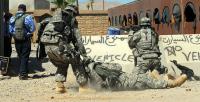-
Apple versus FBI: All Writs Act’s age should not bar its use
A federal magistrate judge in California has issued a warrant ordering Apple to assist the FBI in accessing data on an iPhone used by a suspect in the December 2015 San Bernardino mass shooting. Apple’s public refusal to comply with the order – and its motion asking a judge to reverse the order – have set up a legal showdown that has captivated the technology world. It’s hard not to think that marketing and economics are at least somewhat behind Apple’s actions. But my guess is most people understand that the FBI would not be getting into their phones without a probable cause search warrant. In addition, I would think Apple would not want to have a market composed of people who want to use iPhones for dangerous and illegal activity. The company might actually lose more future customers because of its uncooperative attitude than it would ever lose by helping the government by complying with a court order.
-
-
App warns users when they are about to give away sensitive information online
Researchers are seeing potential in a software application which could effectively warn users when they are about to give away sensitive personal information online. The eye tracker detects where a user’s eyes are at the computer screen and records how long they gazed at that spot. The app uses these two functions to find when a user’s eyes remain on a request for sensitive personal information.
-
-
Russia, Syria triggered refugee crisis to destabilize Europe: NATO commander

General Phil Breedlove, NATO’s Supreme Allied Commander for Europe and head of the U.S. European Command, said Russia and Syria are indiscriminately bombing Syrian civilians to drive the refugee crisis and “weaponize migration.”He said that weapons such as barrel bombs, widely used by the Assad regime against Sunni civilian population, have no military value, and are used solely to terrorize those living in rebel-held territories. He told the Senate Armed Services Committee that the destruction formed part of a deliberate strategy by Russia and the Assad regime to “get them on the road” and “make them a problem for someone else.”
-
-
Syrian, Russian forces targeting hospitals as a war strategy: Amnesty
Russian and Syrian government forces appear to have deliberately and systematically targeted hospitals and other medical facilities over the last three months to pave the way for ground forces to advance on northern Aleppo, an examination of airstrikes by Amnesty International has found. Even as Syria’s fragile ceasefire deal was being hammered out, Syrian government forces and their allies intensified their attacks on medical facilities.
-
-
ISIS “spreading like cancer” among refugees: NATO commander

General Philip Breedlove, NATO’s top commander, on Tuesday told a congressional panel that refugees from the Middle East and north Africa are “masking the movement” of terrorists and criminals. In testimony to the Senate Armed Services Committee, Breedlove said that ISIS is “spreading like a cancer” among refugees. The group’s members are “taking advantage of paths of least resistance, threatening European nations and our own,” he said.
-
-
Destruction of Timbuktu sites by Islamists shocked humanity: ICC prosecutor

Fatou Bensouda, the International Criminal Court’s (ICC) chief prosecutor, speaking at the opening of the war crimes trial against a Malian jihadist leader charged with demolishing ancient mausoleums in Timbuktu, said the world must “stand up to the destruction and defacing of our common heritage.” Ahmad al-Faqi al-Mahdi, 40, is the first jihadist to is the first person to face a war crimes charge for an attack on a historic and cultural monument.
-
-
Cloud-based biosurveillance ecosystem

The Departments of Defense and Homeland Security are developing a system which lets epidemiologists scan the planet for anomalies in human and animal disease prevalence, warn of coming pandemics, and protect soldiers and others worldwide.
-
-
FBI cannot force Apple to unlock iPhone in drug case: Judge
Magistrate Judge James Orenstein in Brooklyn on Monday ruled that the U.S. government cannot force Apple to unlock an iPhone in a New York drug case. The ruling strengthens the company’s arguments in its landmark legal confrontation with the Justice Department over encryption and privacy. The government sought access to the drug dealer’s phone months before a California judge ordered Apple to give access to the San Bernardino terrorist’s handset.
-
-
ISIS executes eight Dutch jihadists for trying to desert

ISIS has executed eight Dutch followers after accusing them of trying to desert. The Dutch secret services say that about 200 people from the Netherlands, including fifty women, have joined ISIS in Syria and Iraq.
-
-
British, U.S. Special Forces training Libyan militias to fight ISIS

British Special Forces have been quietly deployed to Libya for the purpose of helping build an army to fight ISIS militants who have been increasing their presence in the country. The British commandos are working alongside U.S. Special Forces in and around the city of Misrata on north-west Libya to check the progress of jihadist militias.
-
-
WikiLeaks list not connected to terrorist attacks

The WikiLeaks organization was criticized for providing a target list for terrorists when it published a secret memo in 2010 with 200 international sites that the U.S. Department of Homeland Security considered critical to national security. Was there any truth to that claim?
-
-
In FBI versus Apple, government strengthened tech’s hand on privacy
The ongoing fight between Apple and the FBI over breaking into the iPhone maker’s encryption system to access a person’s data is becoming an increasingly challenging legal issue. This case is very specific, and in this narrow case, Apple and law enforcement agencies will likely find a compromise. However, this question is not going away anywhere. With the “Internet of things” touted as the next big revolution, more and more devices will capture our very personal data – including our conversations. This case could be a precedent-setting event that can reshape how our data are stored and managed in the future.
-
-
Suicide bomb detector moves close to commercialization with Sandia engineer’s help
On the chilling list of terrorist tactics, suicide bombing is at the top. Between 1981 and 2015, an estimated 5,000 such attacks occurred in more than 40 countries, killing about 50,000 people. The global rate grew from three a year in the 1980s to one a month in the 1990s to one a week from 2001 to 2003 to one a day from 2003 to 2015. R3 Technologies and a group of other small businesses are developing a way to prevent suicide attacks by detecting concealed bombs before they go off. R3 found a partner in Sandia sensor expert JR Russell who has helped bring the company’s Concealed Bomb Detector, or CBD-1000, close to commercialization over the past two years.
-
-
Refined interview technique can reveal terror plots
An interview technique for eliciting intelligence without asking questions has in a series of experiments proven to work very well. The idea dates back to the renowned Second World War interrogator Hanns Scharff, but has now, for the first time, been empirically validated. The technique can help intelligence agencies reveal plans of future terrorist acts.
-
-
Studying collaboration between research, intelligence communities
In 2013, NC State University and the National Security Agency (NSA) created the Laboratory for Analytic Sciences (LAS) — a collaborative partnership focused on addressing the research challenges associated with “big data.” They soon discovered that a funny thing happens when academic researchers collaborate with the intelligence community: they feel like they are being spied on.
-
More headlines
The long view
Factories First: Winning the Drone War Before It Starts
Wars are won by factories before they are won on the battlefield,Martin C. Feldmann writes, noting that the United States lacks the manufacturing depth for the coming drone age. Rectifying this situation “will take far more than procurement tweaks,” Feldmann writes. “It demands a national-level, wartime-scale industrial mobilization.”
No Nation Is an Island: The Dangers of Modern U.S. Isolationism
The resurgence of isolationist sentiment in American politics is understandable but misguided. While the desire to refocus on domestic renewal is justified, retreating from the world will not bring the security, prosperity, or sovereignty that its proponents promise. On the contrary, it invites instability, diminishes U.S. influence, and erodes the democratic order the U.S. helped forge.
Fragmented by Design: USAID’s Dismantling and the Future of American Foreign Aid
The Trump administration launched an aggressive restructuring of U.S. foreign aid, effectively dismantling the United States Agency for International Development (USAID). The humanitarian and geopolitical fallout of the demise of USAID includes shuttered clinics, destroyed food aid, and China’s growing influence in the global south. This new era of American soft power will determine how, and whether, the U.S. continues to lead in global development.
Water Wars: A Historic Agreement Between Mexico and US Is Ramping Up Border Tension
As climate change drives rising temperatures and changes in rainfall, Mexico and the US are in the middle of a conflict over water, putting an additional strain on their relationship. Partly due to constant droughts, Mexico has struggled to maintain its water deliveries for much of the last 25 years, deliveries to which it is obligated by a 1944 water-sharing agreement between the two countries.
How Disastrous Was the Trump-Putin Meeting?
In Alaska, Trump got played by Putin. Therefore, Steven Pifer writes, the European leaders and Zelensky have to “diplomatically offer suggestions to walk Trump back from a position that he does not appear to understand would be bad for Ukraine, bad for Europe, and bad for American interests. And they have to do so without setting off an explosion that could disrupt U.S.-Ukrainian and U.S.-European relations—all to the delight of Putin and the Kremlin.”
How Male Grievance Fuels Radicalization and Extremist Violence
Social extremism is evolving in reach and form. While traditional racial supremacy ideologies remain, contemporary movements are now often fueled by something more personal and emotionally resonant: male grievance.
